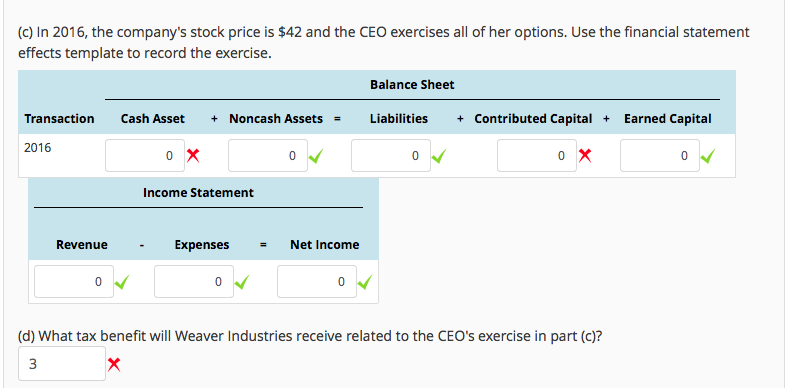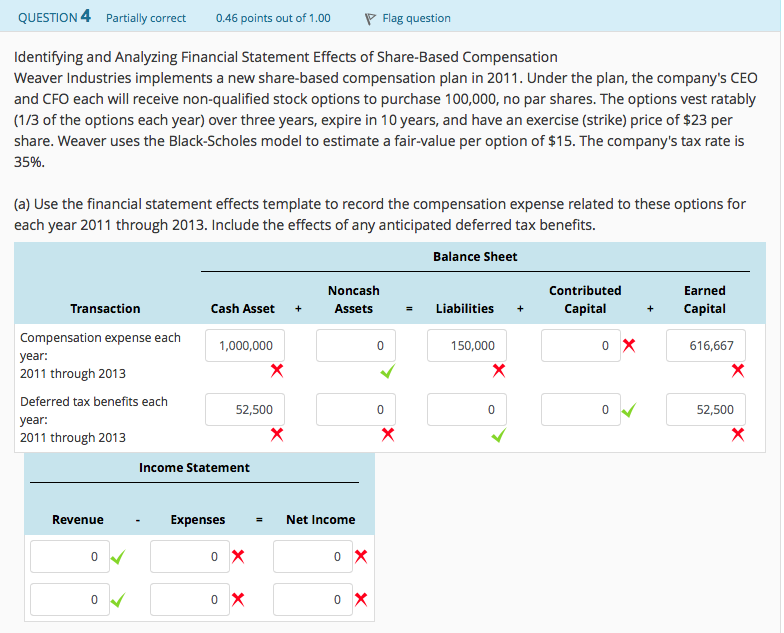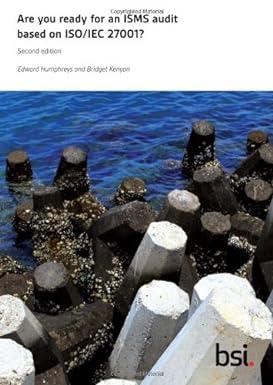Question
Identifying and Analyzing Financial Statement Effects of Share-Based Compensation Weaver Industries implements a new share-based compensation plan in 2011. Under the plan, the company's CEO

 Identifying and Analyzing Financial Statement Effects of Share-Based Compensation Weaver Industries implements a new share-based compensation plan in 2011. Under the plan, the company's CEO and CFO each will receive non-qualified stock options to purchase 100,000, no par shares. The options vest ratably (1/3 of the options each year) over three years, expire in 10 years, and have an exercise (strike) price of $23 per share. Weaver uses the Black-Scholes model to estimate a fair-value per option of $15. The company's tax rate is 35%. (a) Use the financial statement effects template to record the compensation expense related to these options for each year 2011 through 2013. Include the effects of any anticipated deferred tax benefits. Balance Sheet Transaction Cash Asset + Noncash Assets = Liabilities + Contributed Capital + Earned Capital Compensation expense each year: 2011 through 2013 AnswerIncorrect AnswerCorrect AnswerIncorrect AnswerIncorrect AnswerIncorrect Deferred tax benefits each year: 2011 through 2013 AnswerIncorrect AnswerIncorrect AnswerCorrect AnswerCorrect AnswerIncorrect Income Statement Revenue - Expenses = Net Income AnswerCorrect AnswerIncorrect AnswerIncorrect AnswerCorrect AnswerIncorrect AnswerIncorrect (b) In 2014, the company's stock price is $20. If you were the Weaver Industries CEO, would you exercise your options? Explain. Because the stock price is per share, the Weaver CEO should exercise the options because she can immediately sell them for that amount. Because the stock price is per share, the Weaver CEO can immediately recognize a gain of $3 per share by exercising the options. Because the stock price is per share, no gain or loss would be recognized if the Weaver CEO exercises her options and immediately sold her shares. Because the stock price is per share, the options are under-water (out of the money) and the Weaver CEO should not exercise the options.Correct 1.00 points out of 1.00 (c) In 2016, the company's stock price is $42 and the CEO exercises all of her options. Use the financial statement effects template to record the exercise. Balance Sheet Transaction Cash Asset + Noncash Assets = Liabilities + Contributed Capital + Earned Capital 2016 AnswerIncorrect AnswerCorrect AnswerCorrect AnswerIncorrect AnswerCorrect Income Statement Revenue - Expenses = Net Income AnswerCorrect AnswerCorrect AnswerCorrect (d) What tax benefit will Weaver Industries receive related to the CEO's exercise in part (c)?
Identifying and Analyzing Financial Statement Effects of Share-Based Compensation Weaver Industries implements a new share-based compensation plan in 2011. Under the plan, the company's CEO and CFO each will receive non-qualified stock options to purchase 100,000, no par shares. The options vest ratably (1/3 of the options each year) over three years, expire in 10 years, and have an exercise (strike) price of $23 per share. Weaver uses the Black-Scholes model to estimate a fair-value per option of $15. The company's tax rate is 35%. (a) Use the financial statement effects template to record the compensation expense related to these options for each year 2011 through 2013. Include the effects of any anticipated deferred tax benefits. Balance Sheet Transaction Cash Asset + Noncash Assets = Liabilities + Contributed Capital + Earned Capital Compensation expense each year: 2011 through 2013 AnswerIncorrect AnswerCorrect AnswerIncorrect AnswerIncorrect AnswerIncorrect Deferred tax benefits each year: 2011 through 2013 AnswerIncorrect AnswerIncorrect AnswerCorrect AnswerCorrect AnswerIncorrect Income Statement Revenue - Expenses = Net Income AnswerCorrect AnswerIncorrect AnswerIncorrect AnswerCorrect AnswerIncorrect AnswerIncorrect (b) In 2014, the company's stock price is $20. If you were the Weaver Industries CEO, would you exercise your options? Explain. Because the stock price is per share, the Weaver CEO should exercise the options because she can immediately sell them for that amount. Because the stock price is per share, the Weaver CEO can immediately recognize a gain of $3 per share by exercising the options. Because the stock price is per share, no gain or loss would be recognized if the Weaver CEO exercises her options and immediately sold her shares. Because the stock price is per share, the options are under-water (out of the money) and the Weaver CEO should not exercise the options.Correct 1.00 points out of 1.00 (c) In 2016, the company's stock price is $42 and the CEO exercises all of her options. Use the financial statement effects template to record the exercise. Balance Sheet Transaction Cash Asset + Noncash Assets = Liabilities + Contributed Capital + Earned Capital 2016 AnswerIncorrect AnswerCorrect AnswerCorrect AnswerIncorrect AnswerCorrect Income Statement Revenue - Expenses = Net Income AnswerCorrect AnswerCorrect AnswerCorrect (d) What tax benefit will Weaver Industries receive related to the CEO's exercise in part (c)?
(c) In 2016, the company's stock price is $42 and the CEO exercises all of her options. Use the financial statement effects template to record the exercise Balance Sheet Transaction Cash Asset Noncash Assets Liabilities Contributed Capital Earned Capital 2016 0 X 0 X Income Statement Revenue Expenses Net Income (d) What tax benefit will Weaver Industries receive related to the CEO's exercise in part (c)? (c) In 2016, the company's stock price is $42 and the CEO exercises all of her options. Use the financial statement effects template to record the exercise Balance Sheet Transaction Cash Asset Noncash Assets Liabilities Contributed Capital Earned Capital 2016 0 X 0 X Income Statement Revenue Expenses Net Income (d) What tax benefit will Weaver Industries receive related to the CEO's exercise in part (c)
Step by Step Solution
There are 3 Steps involved in it
Step: 1

Get Instant Access to Expert-Tailored Solutions
See step-by-step solutions with expert insights and AI powered tools for academic success
Step: 2

Step: 3

Ace Your Homework with AI
Get the answers you need in no time with our AI-driven, step-by-step assistance
Get Started


